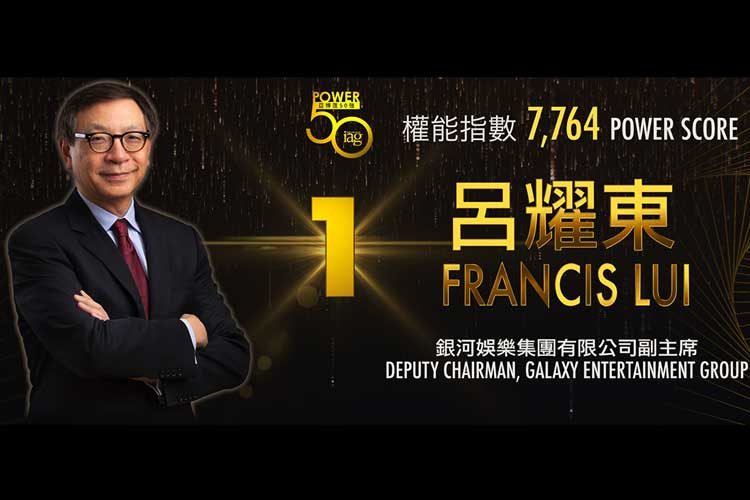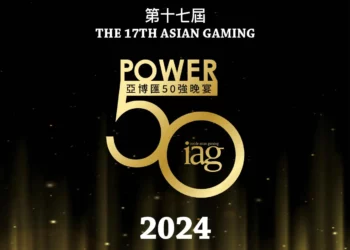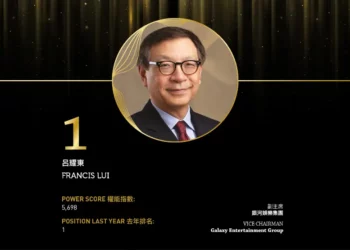DEPUTY CHAIRMAN
Galaxy Entertainment Group
POWER SCORE: 7,764
POSITION LAST YEAR: 2
CLAIMS TO FAME
• Built Galaxy into Macau’s de facto local gaming champion
• Developing largest single land plot in Cotai, Phases 3 and 4 due by 2022
• Technically serves under his 90-year-old father, Galaxy Chairman Lui Che Woo
• Holds strategic stakes in Monte Carlo casino operator SBM and Wynn Resorts
Galaxy Entertainment Group battles Sands China for the Macau gaming market lead, and its flagship Galaxy Macau vies with Marina Bay Sands in Singapore for the title of world’s most profitable integrated resort.
Galaxy has supplanted SJM Holdings as what JPMorgan’s DS Kim calls Macau’s “de facto local champion” casino operator. Galaxy Deputy Chairman Francis Lui has replaced Stanley Ho as Macau’s de facto industry leader, his personality a counterpoint to the flamboyant Ho. The secrets to Galaxy’s success are hidden in plain sight and reflect Lui’s leadership under his Hong Kong tycoon father, Galaxy Chairman Lui Che Woo.
“Galaxy’s vision is to be: Globally recognized as Asia’s leading gaming and entertainment corporation,” the Hong Kong listed company states. “This vision will be achieved through adhering to our proven business philosophy.”
The first tenet of that philosophy is “Local market insights: Leveraging Chinese heritage and deep understanding of Asian and Chinese customer preferences.”
Trained as an engineer in the US, Lui cut his professional teeth working on family development projects in mainland China. He defied the boss’ son stereotype by bringing his own lunchbox and eating with construction workers. That experience, plus extensive research – Galaxy had no gaming background so, unlike most rivals, didn’t approach Macau with preconceived notions – helps Galaxy understand what Chinese consumers want.
Flagship Galaxy Macau reflects that understanding. The Cotai complex has six hotels with 3,600 rooms from top end Ritz-Carlton to budget Broadway. True to its “World Class, Asian Heart” motto, Galaxy features Japan’s Okura and Southeast Asia’s Banyan Tree hotel brands. Understanding the best way to Asian hearts, Galaxy has 120 food outlets from the full gamut of Chinese regional choices to Instagram-able desserts. To emulate Southeast Asia’s beaches, Galaxy created the Grand Resort Deck atop the resort podium, with 350 tons of white sand and the world’s largest rooftop wave pool, plus water rides and slides in a tropical garden setting. It opened a 10 screen cineplex, enabling mainland visitors to see movies that may be unavailable in theaters back home due to film import quotas. Phase 2, opened in May 2015, four years after the first stage, features the Promenade mall with over 200 shops at various price points.
Along with Chinese customers, Galaxy also understands Chinese authorities (the surest bet in Macau may be Galaxy receiving a casino concession in the government’s re-tendering exercise in 2022). Broadway Food Street exemplifies its political savvy, featuring Macau restaurants and products from local SMEs, supporting local and mainland government calls for economic diversification.
Due for completion by 2022, Galaxy Macau Phases 3 and 4 will include an arena and MICE facilities, further promoting diversification. Even with gaming revenue falling more than 10% this year amid its transition from VIP to mass focus, Galaxy is poised to fund that US$6 billion-plus expansion from cash and earnings.
Galaxy also operates casino hotel StarWorld, a leg of the Macau peninsula golden triangle with Wynn Macau and Grand Lisboa, and has strategic stakes in Monte Carlo gaming operator SBM, its partner for a Japan IR bid, and Wynn Resorts.
Philippine President Rodrigo Duterte quashed its initiative for a US$500 million casino resort in Boracay, but Galaxy is planning a non-gaming resort across from Cotai on Hengqin island, a pet project of China’s President Xi Jinping. For Galaxy, there’s no place like home.
For the full list of 2019 Asian Gaming Power 50 winners, click here.






























